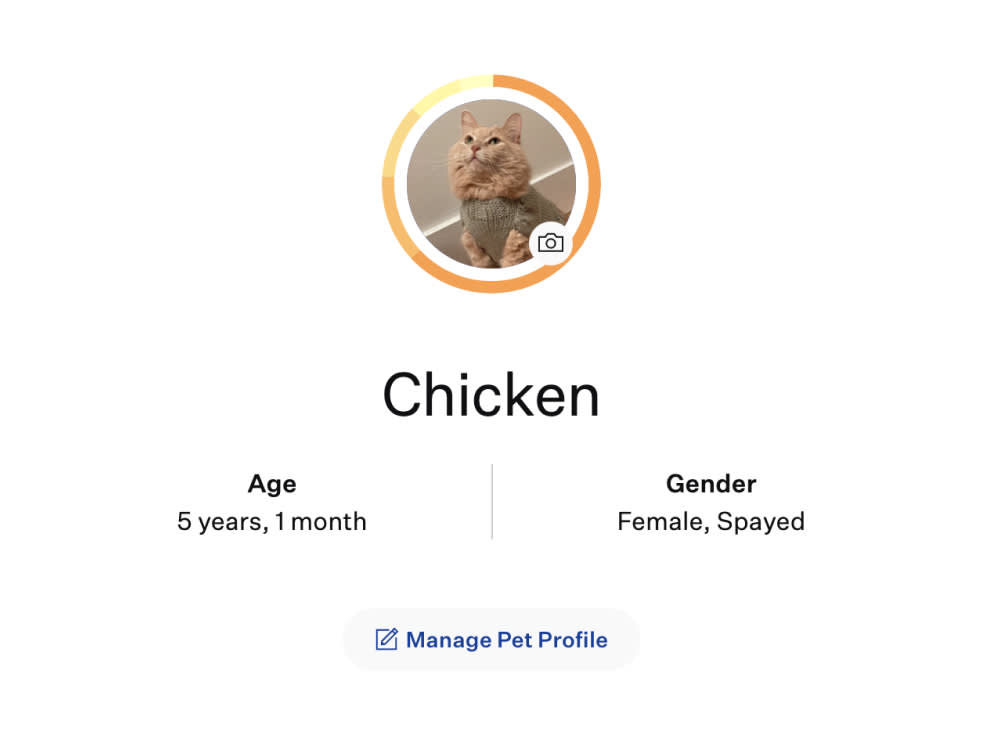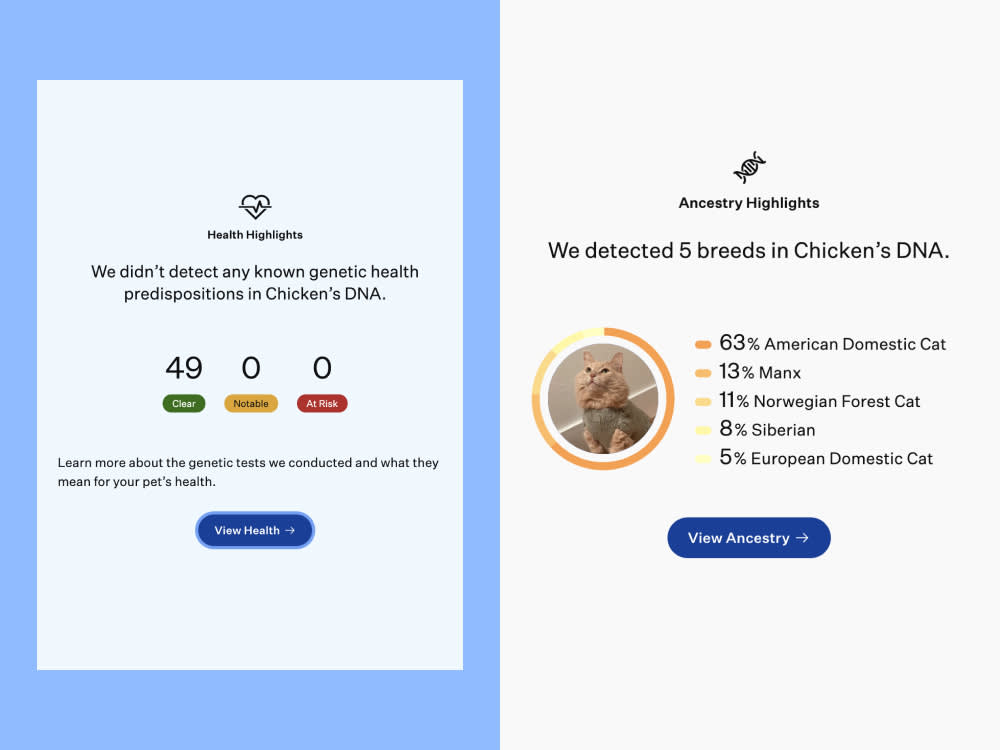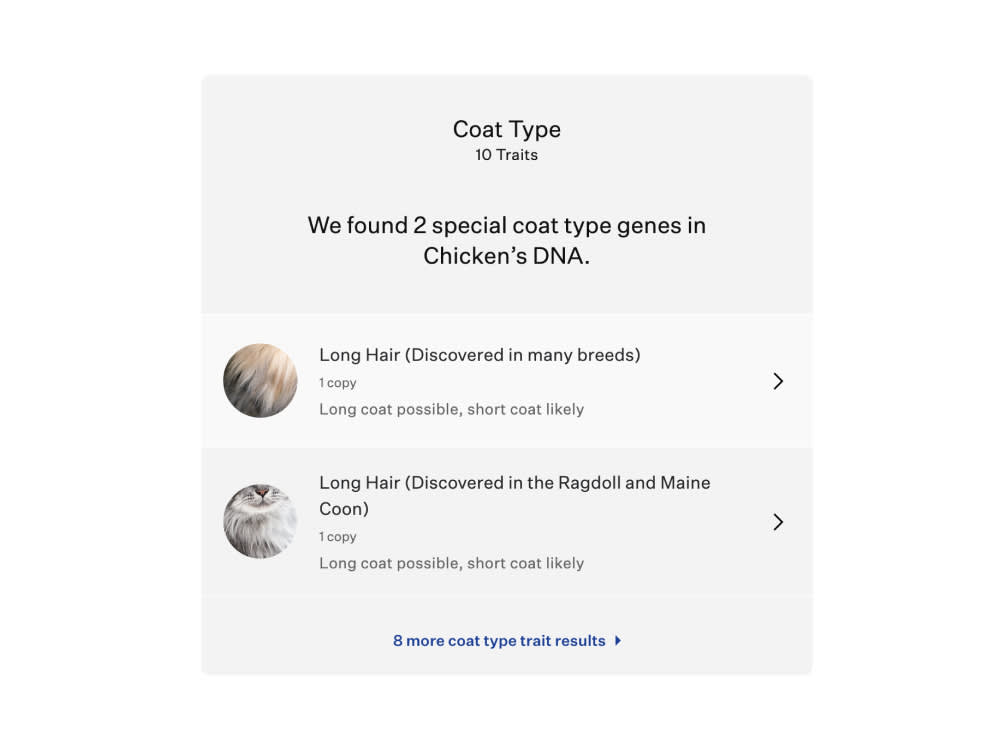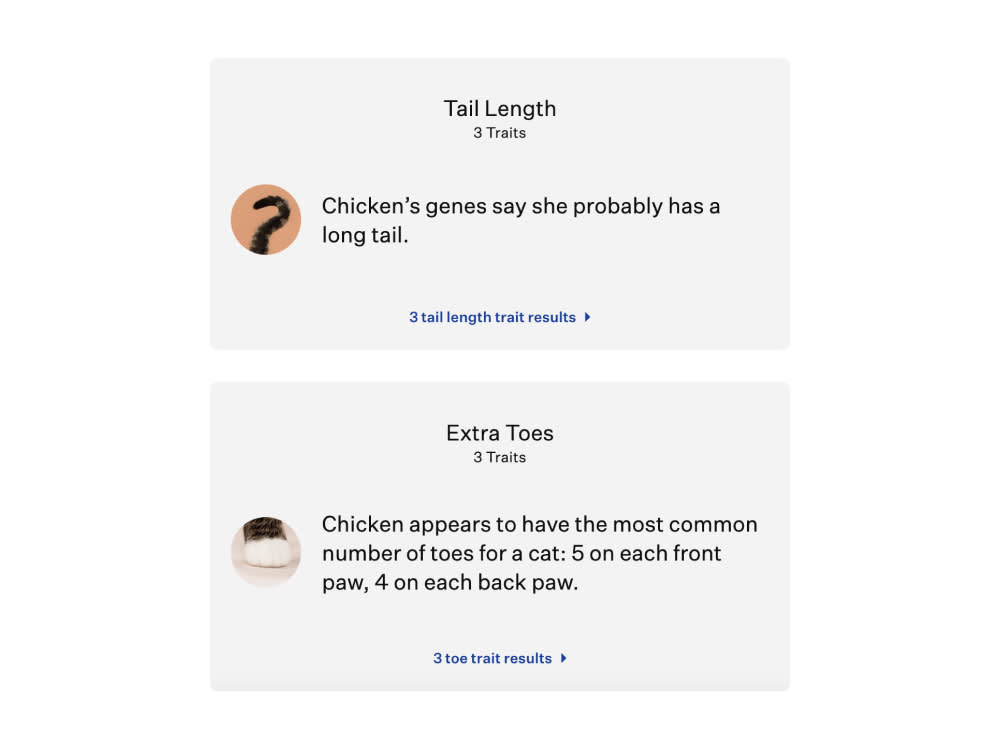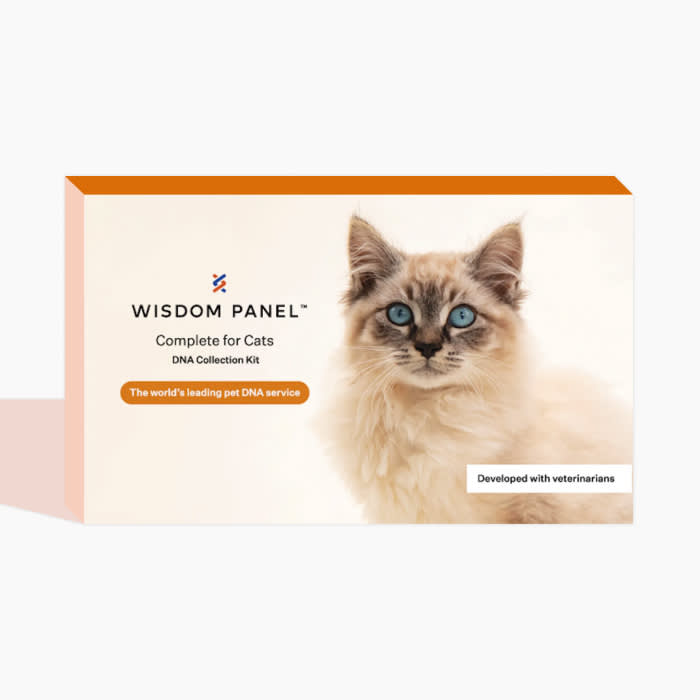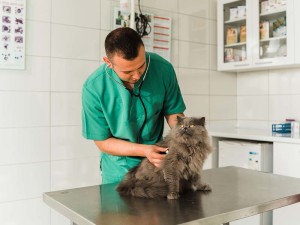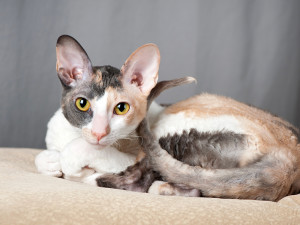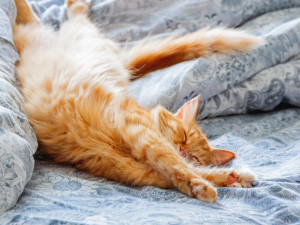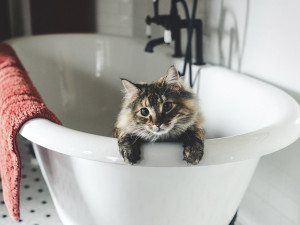I Tested My Cat’s DNA, and Here Are the Results
From health predispositions to breed history, Wisdom Panel’s genetic testing revealed my cat’s internal world.

share article

Your pet wants you to read our newsletter. (Then give them a treat.)
I have to begin by saying that I’m as overbearing a cat mom as they come (and therefore, perhaps, the perfect candidate to try a DNA test kit for cats). If my cat, Chicken, sneezesopens in a new tab, in my mind, she may have a cold and needs to be carefully monitored for the day. If she eats too much foodopens in a new tab, she’s trying to send me a signal that she has a more serious health condition. If she eats too littleopens in a new tab, she’s trying to send me a different signal that she has an upset stomachopens in a new tab or a hairballopens in a new tab coming on. I take notice of these things and worry about them more than the average pet parent, I would deign to say. So when I learned about DNA tests for cats, specifically Wisdom Panel’s DNA testing technologyopens in a new tab, I realized two things: We would definitely be taking the test, and the results were going to affect the way I interact with my cat for the rest of both our lives. Not to be dramatic.
What is a Cat DNA Test?
A DNA test for cats allows you to collect a sample of your cat’s saliva or cheek cells to be mailed to a lab for analysis. The Wisdom Panel’s cat DNA test screens the sample for breeds, genetic health conditions, tests for physical traits, and identifies your cat’s blood typeopens in a new tab. You get the results emailed to you in two to three weeks. Those results can then be interpreted by a veterinarian to get insights into your cat’s overall health. If your cat has “at- risk” traits, Wisdom Panel offers a free call with a vet to talk through your concerns.
The Process: How to perform a DNA test at home?
Getting started was easy enough. When I received the cat DNA test kit, enclosed were specific instructions (namely, to wait several hours after a meal to get a sample), a swab, and a return label. I had a good handle on the plan. My cat, however, I did not have a handle on at all. Believe it or not, she did not love having a bristly brush rubbed all around her gums and let me know in the form of a warning “meow.” Luckily for the both of us, 15 seconds went by quickly. Here are the steps to perform Wisdom Panel’s DNA test at home:
Swab their cheek to gather the DNA sample.
Swab your pet’s cheek for at least 15 seconds, making sure there’s nothing in their mouth and avoid touching the swab.
Firmly roll and rotate the swab inside their cheek, applying gentle pressure from the outside.
Allow the swabs to dry for at least five minutes.
Send their sample to the lab.
The lab will determine the complete set of genes found in your dog or cat (aka genotyping). The sample will be screened against the world’s largest breed database to ensure accurate results.
Understand the results
Once you get the DNA results, usually in two to three weeks, you can interpret them with the help of a veterinarian to understand if your cat has any unique health traits that predispose them to certain behaviors or conditions.
How accurate are cat DNA tests?
After all this aggravation, I wondered what insights I’d really be gaining into Chicken’s health through the test and what data allowed them to test for such specific traits. How much could a DNA test really reveal about the ancestry of cats? Because, as I mentioned earlier, any sign she exhibits that might even suggest distress leaves me feeling unnerved for days, I wanted to know she hadn’t suffered the swab in vain. That’s when I reached out to Wisdom Panel’s veterinarian and data and veterinary genetics manager, Dr. Annette Louviere for answers. “Wisdom Panel™ health results are over 99.99 percent accurate,” Dr. Louviere says, adding that this is attributed to a “highly accurate microarray platform and quality-control guidelines similar to those used by human genetics testing companies.” Well, that clears things up.
When I finally got a little ping in my inbox saying “Chicken’s DNA results have arrived,” the wave of anxiety that I felt immediately made it clear that my own health was a secondary concern, as I never would have rushed to the computer to receive lab results in the way I did for Chicken’s. As I opened the online portal, I was completely shocked to learn that my most pressing concern was not a concern at all: Chicken had tested negative for any genetic health predispositions. I couldn’t contain my excitement as I waved my boyfriend towards the computer while almost involuntarily repeating, “I told you she’s the healthiest cat!”
How could this be possible? Dr. Louviere helped clarify: “The chances of your pet developing a disorder if they carry the associated gene depends on several factors. Examples being if the disease is expressed in a dominant or recessive manner (known as ‘mode of inheritance’), number of copies the pet inherited (dominant disorders need one copy to be expressed while recessive need two copies), and the specific disease risk factors (such as if the health condition is known to the breeds found in the ancestry).”
The Results: Reviewing the Cat Breed Test Results
In the following minutes, in which I partially blacked out from a combination of excitement and nervousness and quietly murmured “good results,” as if saying that would generate an outcome, I also learned what breed, or breeds, rather, Chicken is. When I adopted her from the ASPCA on the Upper East Side, the technician who was caring for her had told me that Chicken and a gray cat a few months older than her had been found in a dumpster nearby. I’d mused over the idea that the little gray cat in the crate next to her was her sibling, making Wisdom’s relative finder feature extremely appealing to me. I’d also wondered how she’d ended up in a dumpster in upper Manhattan in the first place, and if she’d been born on the streets or if she’d escaped an affluent family’s townhome.
To bring clarity to my daydreams, she looks purebred and the Google search of “Maine Coonopens in a new tab” and other “cream” or “buff” colored cats generated uncanny results of similarly adorable and expensive looking cats. That’s why I was I brought back to reality when I learned that the majority of her heritage was regular old “domestic medium hair,” just as it was noted on her chart at the ASPCA. Her DNA test noted: “long coat possible” and “short coat likely.” She met them in the middle. It made me strangely more proud of my little cat to learn of her humble roots.
The final point of curiosity I had surrounding Chicken’s genetic makeupopens in a new tab was her tail length. When she was a kitten, she had an unusually short tail, which she subsequently grew into with age. Now, she bares a bushy, dare I say feathery tail that catches the eye of all she graces with her presence. Learning all of this from a simple test was an exhilarating experience that cleared up every question I had about Chicken’s background without leaving me questioning further.
When I checked back in with Dr. Louviere, she affirmed my feelings about the experience: “Performing a pet DNA test doesn’t just satisfy curiosity — though that’s often part of the fun! Knowing your pet’s genetic makeup through Wisdom Panel™ tests empowers you to tailor training, nutrition and care to your pet’s unique needs.” Below, you can try Wisdom’s Full Panel DNA test for yourself (and your cat).
FAQ (People Also Ask):
1) How accurate are cat DNA tests?
Cat DNA tests can be a helpful diagnostic tool for vets, breeders and owners, but the industry isn’t regulated, so it’s tough to verify accuracy claims. The more breeds in the company’s database, the more accurate the results.
2) Are cat DNA tests invasive or harmful to the cat?
Cat DNA tests should not be invasive or harmful — aside from the animal’s potential brief discomfort when you are gathering the sample, it should not hurt them.
3) Can cat DNA tests determine specific health conditions or breeds?
Yes, cat DNA tests screen for breeds, genetic health conditions, physical traits, and identifies your cat’s blood type.
4) What is the limitation to performing cat DNA tests?
Wisdom Panel™ tests are 99.99 percent accurate, so the limitations are minimum when it comes to finding out your cat’s DNA history.
5) How long does it take to receive the results of a cat DNA test?
It usually takes a few weeks for you to get the results from a cat DNA test.
References

Avery Felman
Avery is a writer and producer. She has written for numerous publications, including Refinery29, BuzzFeed, and V Magazine. When she’s not at her computer, you can find her reading, practicing her Greek on Duolingo, and delving into the Sex and the City discourse. She lives in Brooklyn, New York with her husband and their cat, Chicken, who rules with an iron fist.
Related articles
![a veterinarian holding a gray fluffy cat]() opens in a new tab
opens in a new tabHow to Make Vet Visits Less Scary For Cats
Two vets share their tips, from choosing a safe carrier to considering anti-anxiety medication.
![Cornish Rex cat laying down on a pillow]() opens in a new tab
opens in a new tabThe Cat Breed-Behavior Connection
Which cats are more likely to have stranger danger? Bite the hand that feeds them? Do the zoomies? Scientists studied 5,700 pet cats and discovered some interesting traits.
![Cat stretching on blue bedding]() opens in a new tab
opens in a new tab5 Calming Products for Cats
Because New Year’s Eve is never a silent night.
![A festive shot of the Pupwell fancy dog grooming kit including a Travel bag, a Slicker Brush, a De-matting comb, a Fine tooth comb, a Metal tooth comb and three metal Christmas tree decorations in front of a burgundy background]() opens in a new tab
opens in a new tabPupwell’s Luxury Dog Grooming Kit Helps Pups Shed Fur, Not Tears
More grooming, less fight (as long as you use the provided lick mat).
![A fluffy cat sitting in a white bathtub.]() opens in a new tab
opens in a new tabYour Cat Might Despise Baths, But This Biodegradable Shampoo Will Make Them Purr
Scrub-a-dub!
